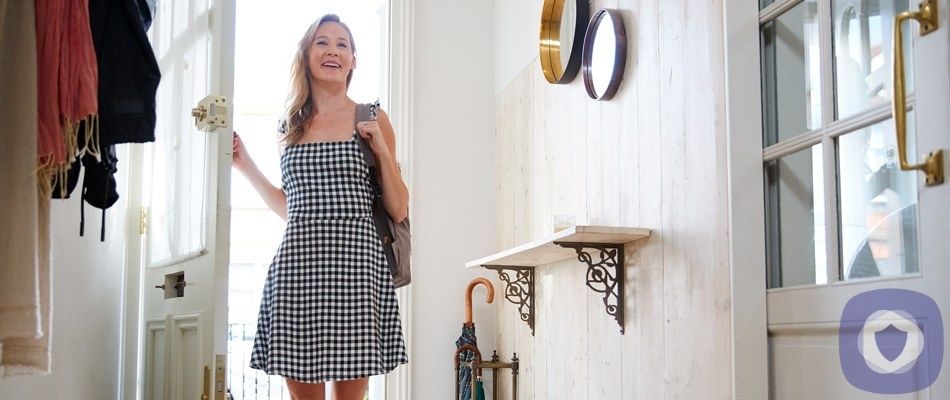Electric door locks are more than just another gadget to add to your smart home ecosystem. They add convenience, reliability and even an extra layer of protection to your home when compared with a traditional lock. Before figuring out which one is perfect for your home, it’s important to learn more about how these smart door locks work, and the differences between technologies offered.
Electric door locks: How do they work?
To fully understand electric door locks, let’s first understand how traditional locks work. Those are generally manufactured with a pin and tumbler. In order to open the lock, you have to insert the correct key. Put the wrong key inside, and you won’t be getting inside the door.
An electric lock, on the other hand, doesn’t need a physical key for entry, unless you happen to want one for a backup. Smart door locks have actuators inside, which connect the bolt to a motor, which is moved by an electric impulse. How that impulse is activated depends on the type of electric door locks you choose. The most common varieties of electric door locks include:
- Bluetooth and Wi-Fi locks: These types of smart locks utilize Bluetooth and Wi-Fi technologies, which allow you to open your front door using a smartphone. This adds a ton of flexibility to your home security, allowing you to do things like provide entry for people while you’re not home, check on the lock status remotely and use timing presets to make entering and leaving a breeze.
- Biometric: With these types of smart locks, you can program your own fingerprint to gain entry, rather than using a phone or traditional key. This means only you and those bearing the other fingerprints programmed can access your home.
- Keypad: These types of smart locks are incredibly popular and allow users to program codes into a keypad to gain entry. Oftentimes they have physical keys as backups in case of battery issues.
- Key fob: Instead of utilizing a smartphone or traditional key, some smart locks can be opened with a key fob or key card.
Electronic locks: Pros and Cons
While smart locks seem like a no-brainer, there actually are some downsides you should know about before making the purchase.
Pros
- No keys needed: There’s a certain freedom in walking up to your door and not having to dig through your purse for your keys. Or maybe you’re always walking up to your door with your hands full or kids in tow. Forget needing that extra hand to open a door with these smart locks.
- Easy access: Whether a user wants to allow entry to a family member who forgot their key or deny access to someone wanting to come inside, electric door locks provide lots of flexibility when it comes to accessing entry remotely.
- Alarm options: Some smart door locks offer an alarm, which means if anyone is trying to gain entry or pick a lock, you’ll hear a loud siren. This is a great security addition that comes with certain models.
- Monitored options: Taking the alarm a step further, some companies will offer monitoring, which of course comes with a fee. This means if anyone is trying to gain access that isn’t allowed, you’ll be notified and authorities will be called.
- Tougher to pick: It’s true that virtually any lock can be picked, but an electric lock can add an extra layer of security for possible intruders.
- Voice activation features: If you just laid down in bed and forgot if you locked the door, you can ask Alexa the status and even lock the door remotely. While it’s definitely not a must-have feature, it’s pretty cool to have if you’re a techie.
- Scheduling options: Electric door locks allow you to schedule when your door locks, or even lets the user set a timer to lock a certain amount of time after you’ve left for the day. If you’re forgetful, this could be a great option to have.
Cons
- Possible hacking: While hacking smart door locks isn’t exactly easy, it can be done.
- Keypad codes: can be guessed If you use your keypad enough, you can actually leave fingerprints on the numbers, making it easier for thieves to guess. Make sure to change your code every once in a while to keep your home safe.
- Battery: can die If you’re forgetful when it comes to changing batteries, your smart door locks can die. Without a traditional key backup, it can be annoying to gain entry back into your door, and require some extra work.
- Power: outages may cause issues If your home is prone to power outages, you may want to think hard about getting smart door locks that run on power. If there’s an outage, features won’t work properly, and at that point, why even have a smart lock in the first place?
- Some are completely keyless: There are certain models that have no backup key at all. While that may be ideal for some, it may turn into more of an issue if your lock malfunctions.
- More expensive: With all the incredible features you get with smart door locks, you shouldn’t be surprised they are much more expensive than a traditional lock. This may be a turnoff for budget conscious consumers.
- Confusing for those without tech skills: If you’re someone who has trouble using a smartphone in the first place, electric door locks may be a little too tech-savvy to add to your home.
- Some require complete replacement of deadbolt: If you’re a renter, you won’t want to purchase smart door locks that require tedious installation and complete replacement of the lock itself. Instead, you may opt for electric door locks that can be retrofitted, and perfect for apartment dwellers. (Check out our picks for the best apartment door locks.)
What to consider when shopping for smart door locks
There are a plethora of smart locks to choose from with varying degrees of features to help make your life easier. But that doesn’t mean each one will have the features that will fit your lifestyle. Some factors to consider:
- Backup keys: If you’re ready to take the plunge into the world of smart locks, but still feel the need to have a traditional lock, look for an option that has both traditional and electric locking functions. This also has a benefit if you are prone to power outages; the traditional key will allow you to gain entry no matter what.
- Installation: While both renters and homeowners can benefit from smart door locks, there are definitely products that are better for renters. If you live in an apartment, you should look for a lock that can fit over the existing one. You don’t want to get charged for any damage to your lock, and you may not even have permission to replace your original lock in the first place.
- Smartphone integration: Electric door locks without smartphone integration exist, but they certainly don’t have the most features available. Look for an option that is smartphone compatible in order to make the most out of your smart lock.
- High-traffic home: Whether you have a big family or frequent house guests, electric door locks can really make your life easier by providing remote access whenever needed.
Smart door locks: Wrapping it up
Do smart locks provide security and convenience? Yes. Are they safer than a traditional door lock? That remains to be seen. When purchasing electric door locks, you should focus on the many benefits it will provide, including easier access, scheduling, monitoring capabilities and remote control of your front entryway.
If you are already building a smart home ecosystem, a smart lock is a logical next step. But you shouldn’t purchase one just to make your home safer. You should add one if it fits your lifestyle, and will create more flexibility in your day-to-day life. If you’re conflicted, you can always purchase a smart lock with a traditional lock built in and have the best of both worlds.
This article has been reviewed and approved by Officer Banta.

Officer Banta is the official SecurityNerd home security and safety expert. A member of the Biloxi Police Department for over 24 years, Officer Banta reviews all articles before lending his stamp of approval. Click here for more information on Officer Banta and the rest of our team.

